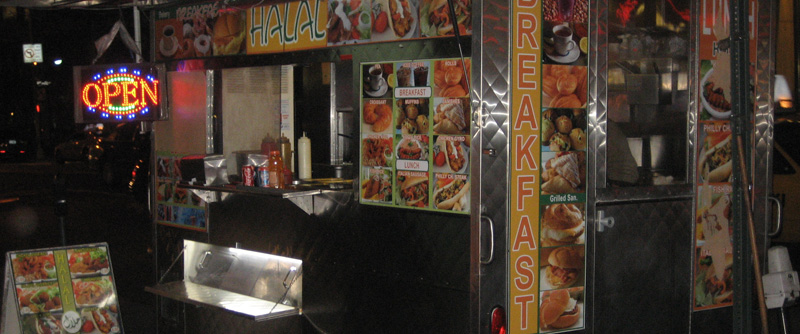On weekends, Sharif Esmail works the night shift at one of New York’s many halal food carts – one that never moves and never closes.
Parked on the corner of Water and Wall streets in Manhattan’s Financial District, it stays open all day and night in a neighborhood where everything else closes at the end of the workday. Surrounded by banks, office buildings and upscale cafes catering to the Wall Street crowd, the cart brings a nitty-gritty feel to an aseptic part of the city.
At first sight, the fairly large cart looks like a truck, but its tiny wheels and towing hook give it away. The old Ford van that once towed the cart to this seemingly permanent location is forever parked right behind it on the street, like a trusty sidekick. At night, a blue and red electric “open” sign is fastened with a plastic bag to the tin awning lights, illuminating photographs of tasty dishes plastered over much of the outside of the cart.
When I first talked to Sharif, I noticed that he listens with his mouth slightly ajar and his eyes open wide. Maybe it’s this attentiveness that has helped him learn surprisingly good English since he emigrated from Egypt, just three years ago, or maybe he just has trouble hearing over the honking horns and the incessant hum of the power generator. Every time I’ve seen him working, he has been wearing the same thing: an oversized black paint-spattered sweatshirt hung loosely over his wiry frame, a white apron, worn jeans and a faded vintage New York Yankees hat to cover up his already-receding hairline (he’s only 25). He professes a love of baseball, though he still has trouble with the basic rules. “Yankees have good year this year, yes?” he once asked me. I confessed I was from Boston and held up my cell phone to show him proof: the big Boston Red Sox logo set as my background. His expression remained blank; he seemed unaware of the rivalry.
When he’s not working, Sharif spends most of his time in Astoria, Queens, where he sublets a small room from a Pakistani family. He lives alone, having moved alone from Helwan, Egypt, a suburb of Cairo, to New York City in 2005. He has no cell phone, but he’s allowed to receive calls on his landlord’s phone, and he calls his family a few times a month using an international phone card. Back home, he lived with his parents and older sister, until she got married and moved out.
“I very close to my sister,” Sharif said. “When she move from home, I never see her.” When he finished school at 17, he worked at a textile-shipping warehouse for three years, then moved to Cairo to work for his brother-in-law’s taxi company. He wouldn’t go into details, but the two men did not get along. “He was a dog,” said Sharif. “He treat me and my sister very bad.” When he discovered that a cousin of his close friend was doing well in New York City, Sharif decided to make the move. This acquaintance has since moved to Florida, and Sharif is thinking about doing the same thing. “I like New York, but it too expensive,” said Sharif. “I know they say think business long term, but I want to save more. I want family.”
At a more conventional business, Sharif’s night shift would be the third shift, but instead it’s only the second—of two. He and another worker divide the day into two 12-hour shifts, the first beginning at 5:30 a.m. I asked him why the cart stayed open 24 hours. After all, not many people crave a rice dish on their way to work in the morning. He explained that it was just too expensive to park the cart in a garage every night, and since it’s against the law to leave it on the street unattended, the best alternative is to stay open.

